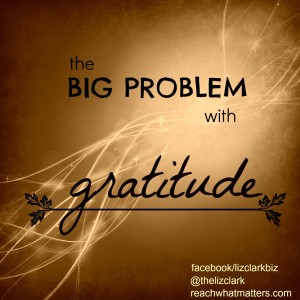November is here!
It’s sure to be full of everything we’ve come to know and love about the month:
- even more pumpkin
- culturally irrelevant graphic and interior design (does anyone actually relate to cornucopias?)
- The BEST HOLIDAY (Thanksgiving!)
- Facebook feeds and blogs overrun with “gratitude” and “thankfulness” posts.
The driving idea behind these posts are absolutely wonderful.
Many of us do get caught up in our relatively small troubles and forget to “count our blessings.”
I’ve spent more than 25 years looking for the positive things for which to be thankful, even in some pretty awful circumstances.
One example comes to mind. In 2008, my husband was deployed in support of Operation Iraqi Freedom. Our four kids ranged between the ages of 2 and 8 that year. I was working full time. It was an incredibly stressful year.
The kids missed their dad (as did I) and sometimes the smallest, most mundane thing would become the catalyst for a meltdown (for them or me).
One day, in a moment of total frustration and exhaustion, I asked (maybe ordered?) them to tell me things they were thankful for. That went over like a lead balloon and resulted in that wide-eyed “uh-oh-Mom’s-upset-about-something” stare.
I took a deep breath, apologized for my anger and said something to the effect of: “Can you just tell me at least one positive thing? Let’s make it a game. Finish the sentence: ‘At least _____.’ I’ll go first, “At least it’s not raining!”
And so was born the Clark Family “At Least Game.”
My sniffling kids all took turns playing and within 3 turns everyone was feeling happier.
I chalked that up as a parenting win! We were all in desperate need of happy thoughts and perspective to make the chaotic, crazy life we were living seem “not that bad.”
We played the “At Least Game” a lot that year.
I came to realize that I had been playing a subconscious version of this game all my life.
I played it to avoid issues in my marriage: “At least my husband loves God and loves me. I am grateful to be married.”
I played it to avoid taking responsibility for my workaholism: “At least I have a job. I am grateful to have a steady income.”
I played it to keep myself from growing as a person: “At least I’ve survived so far. I am grateful to be alive.”
Don’t get me wrong: genuine gratitude in and of itself is a wonderful thing.
But gratitude becomes a problem when we use it as a tool of relativism to minimize real, actual problems in our lives.
“Relative gratitude” has its place – sometimes we do need to get a grip when we’re melting down about the availability of pumpkin spice lattes.
But when we start applying it to real life problems, it can be dangerous. We use “relative gratitude” to measure real problems up against some other extreme and say, “Well, at least it’s not that bad.”
And, maybe that’s true: maybe it’s not that bad.
But the fact that one problem is not as bad as another does not mean we get a free pass to ignore the original problem.
Take, for example, a child who screams out in pain having fallen from a tree. You run to him and discover he has a broken arm. You could say, “Well, at least he didn’t kill himself,” and then tell him to be thankful he’s alive and go back to playing.
This is an extreme example, but we do this to ourselves all the time.
We ignore actual, real problems and bad choices by comparing them to bigger, scarier problems. When we do this, we’re essentially saying that the bigger, scarier problem is our action threshold.
We’re saying: “I don’t need to really worry/take action/do something proactive to fix this unless ______ happens .”
But do you know what?
Problems get worse. And we just keep finding bigger, uglier problems to compare them to:
“At least it wasn’t drugs.”
“At least he got probation – no jail time.”
“At least he didn’t hit the kids.”
“At least she behaved for Thanksgiving.”
I used “relative gratitude” to enable myself to live a chaotic, unbalanced life for many, many years.
Finally, I stopped. I remain so, so grateful for the blessings in my life, but I decided to actually do something about the problems that were causing me grief.
This November, as you compose your “gratitude” posts, I have a NEW type of gratitude challenge for you. Take a moment to ask yourself if you’re using “relative gratitude” – and if you discover that you are, ask yourself instead:
“What action can I take to actually fix a problem instead of trying to convince myself to be thankful for it?”
Do you need to have a tough conversation?
Do you need to set some boundaries and say “no” to some folks this holiday season?
Do you need to reconnect with family and friends?
It might seem scary, but you can do it, my friend. And by the way? I am genuinely grateful for you. 

